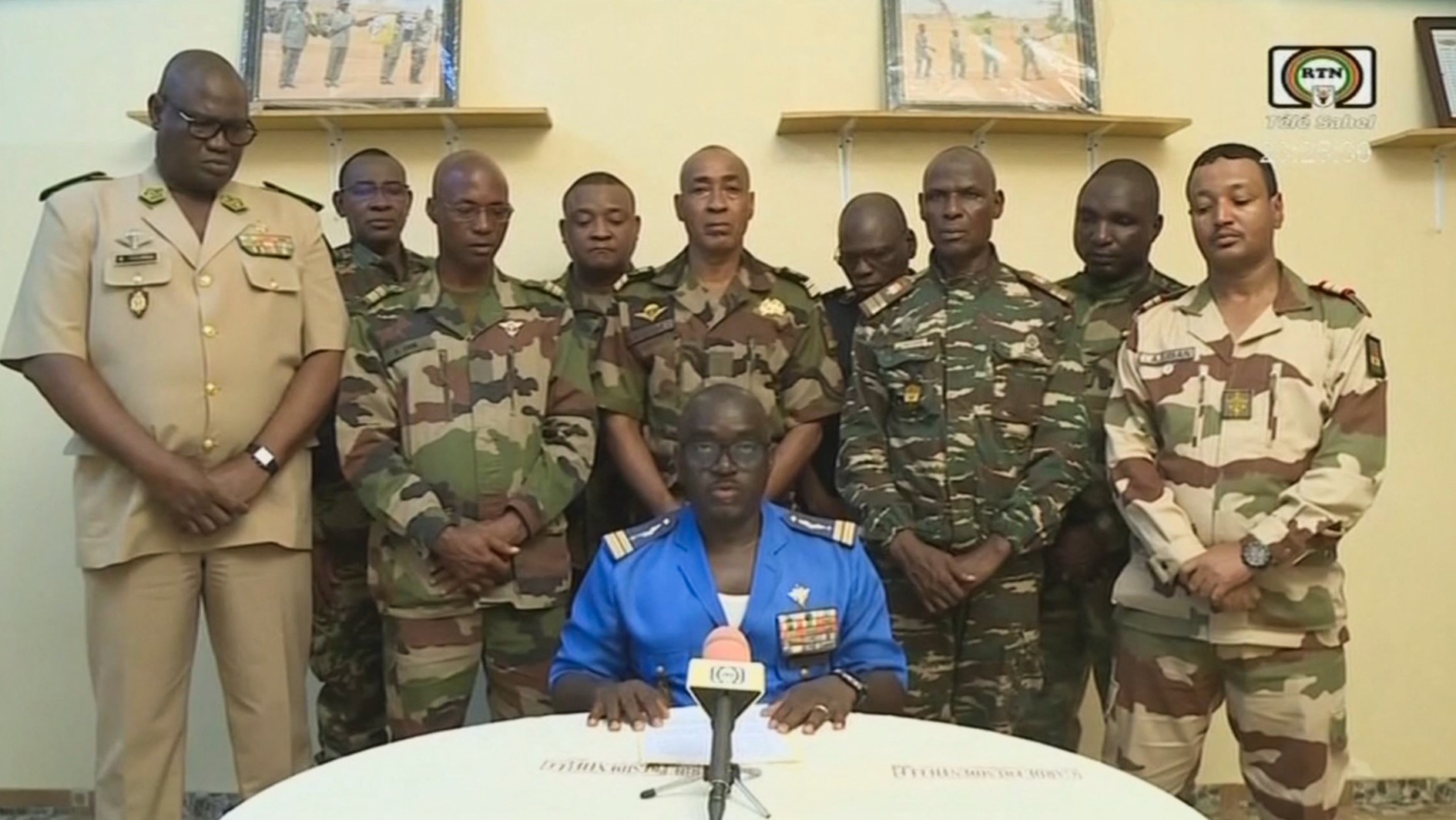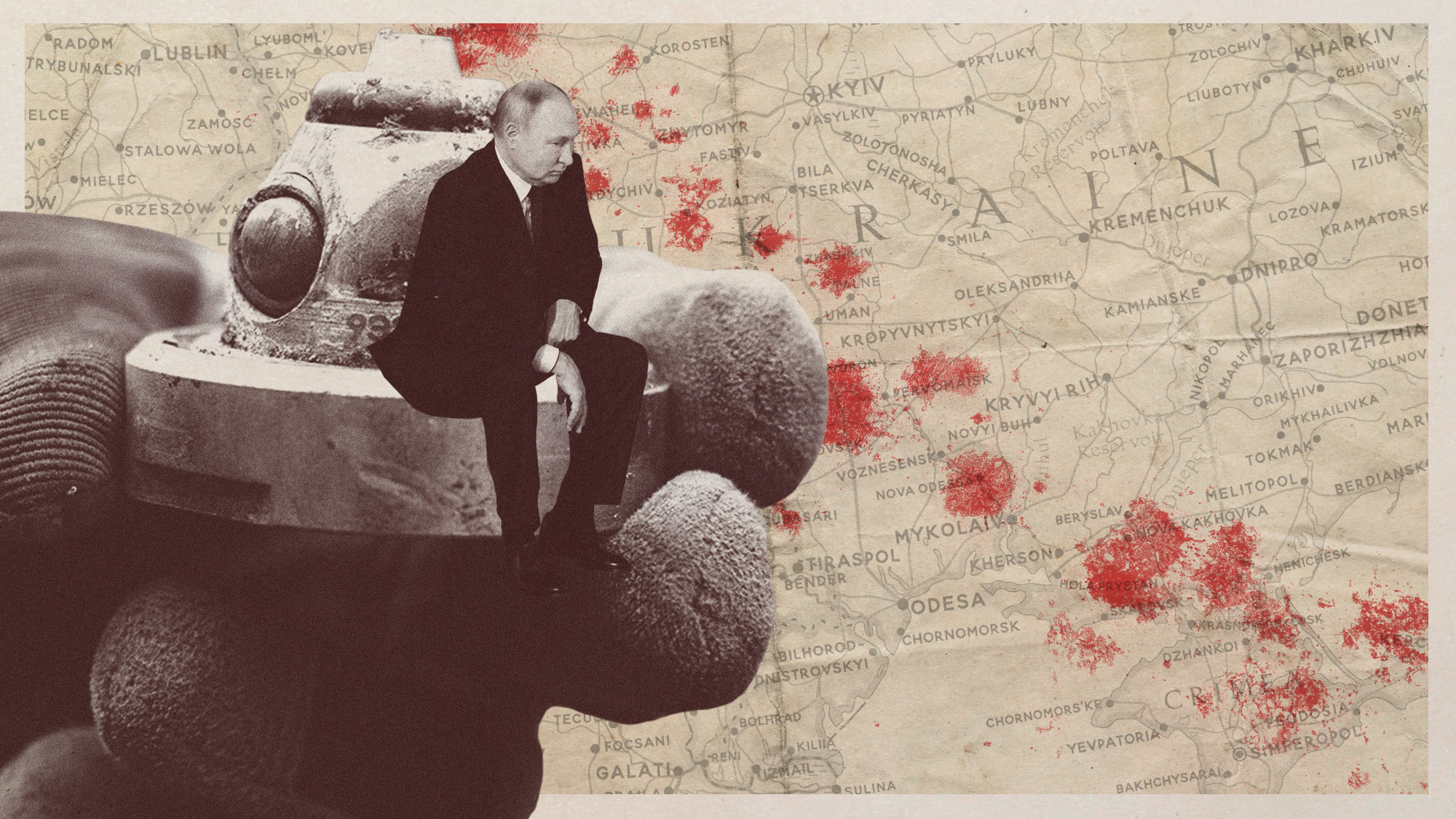What role is Russia playing in the Niger coup?
Vladimir Putin will ‘welcome’ chance to expand influence in region, despite no indication he was behind military takeover

A free daily email with the biggest news stories of the day – and the best features from TheWeek.com
You are now subscribed
Your newsletter sign-up was successful
Thousands of supporters of the junta that seized power in Niger last week have taken to the streets to wave Russian flags and sing the name of Vladimir Putin.
Western countries have strongly condemned the overthrow and detention of the democratically elected president, Mohamed Bazoum, by presidential guards on Wednesday. General Abdourahmane Tchiani, who led the coup, has declared himself the country’s new ruler.
While there is no indication Moscow had a direct hand in last week’s events, pro-junta demonstrators marched through the streets of the capital Niamey on Sunday voicing support for Russia and denouncing the former colonial power France before attempting to storm its embassy, Le Monde reported. The French paper said demonstrators “ripped off and stamped on a plaque bearing the words ‘Embassy of France in Niger,’ replacing it with Niger and Russian flags, while others shouted ‘Long live Russia,’ ‘Long live Putin,’ and ‘Down with France’”.
The Week
Escape your echo chamber. Get the facts behind the news, plus analysis from multiple perspectives.

Sign up for The Week's Free Newsletters
From our morning news briefing to a weekly Good News Newsletter, get the best of The Week delivered directly to your inbox.
From our morning news briefing to a weekly Good News Newsletter, get the best of The Week delivered directly to your inbox.
What did the papers say?
Russian president Vladimir Putin has long sought to expand his country’s influence in the region, “but it is unclear yet whether the new junta leaders are going to move toward Moscow or stick with Niger’s Western partners”, Le Monde said.
General Tchiani appeared on state TV in the immediate aftermath of the coup to justify his actions and make a direct plea for international understanding and assistance.
His appeal was quickly pounced on by Yvegeny Prigozhin, leader of the Wagner group of Russian mercenaries, who threw his support behind Tchiani and offered his fighters’ services. The group, which launched its own aborted rebellion against Putin in Russia last month, is already operating in Mali, as well as Burkino Faso and Central African Republic, and sees the takeover in Niger as “the chance for a new foothold in Africa’s ‘coup belt’”, said The Times.
While “African countries and western powers have reacted with alarm to the coup”, if it holds, “the putsch would complete an unbroken swathe of junta-led states from the Atlantic to the Red Sea, where Russia and western powers have vied for influence”, said the paper.
A free daily email with the biggest news stories of the day – and the best features from TheWeek.com
Following coups in Mali and Burkino Faso in recent years, Niger has become the base for Western counter-insurgency operations in the region, hosting troops from Germany, Italy, France and the US. The coup in Niger threatens to disrupt the West’s entire strategy for fighting Islamist militants as they expand across western Africa, “and potentially hand Russia a strategic advantage as it tries to widen its own influence in the region”, said The Wall Street Journal.
Paris, Washington and Brussels consider pro-West Bazoum “one of their most important strategic allies in the region”, said Al-Monitor and his removal “will mean the toppling of Niger-French cooperation, with large regional repercussions”, including harming efforts to stem the flow of African migrants into Europe.
On Sunday, the Ecowas bloc of West African nations held an emergency summit in Nigeria, and announced it was suspending relations with Niger. In a statement read out after the summit, the group said it had “zero tolerance” of coups and would “take all measures necessary to restore constitutional order” if Bazoum was not reinstated within a week.
“Such measures may include the use of force” and military chiefs are to meet “immediately” to plan for an intervention, it added.
“This is the first time Ecowas has threatened military action to reverse the coups that have taken place in the region in recent years,” said the BBC.
What next?
The coup in Niger “shifts the geopolitical influence map of Africa”, said Al-Monitor, with diplomats in Paris and Brussels telling the news site they have “few illusions about what lies ahead for Niger’s alliances”.
Already open to Russian support, the response of Western and African countries could further push the new regime towards Moscow.
The US, United Nations, European Union and France have condemned the takeover, with French president Emmanuel Macron suspending all development aid and budgetary support to Niger.
Of all the countries in the region, Niger has “the most at stake if it turns away from the West, given the millions of dollars of military assistance the international community has poured in”, said Sky News.
The African Union has taken a similarly strong stance, issuing a 15-day ultimatum to the junta to reinstall the country’s democratically elected government.
Tchiani has said any foreign military intervention would result in “the massacre of the Niger population and chaos”, so much will depend on whether Russia throws its support behind him. Speaking at the Russia-Africa summit in St Petersburg last week, the country’s foreign minister Sergei Lavrov joined calls for the release of Bazoum, saying: “We believe that the coup is unconstitutional and we always take a principled and clear position on that.”
Yet Dr Benjamin Petrini, from the International Institute for Strategic Studies think tank, speaking to Sky News, said the coup would likely be welcomed in the Kremlin.
Niger has been subject to a disinformation campaign by Russia in recent years, leading to growing dissatisfaction with France’s role in the country. As a result, Moscow “would look at this very favourably because this is what Russian strategy has been in the last few years, to erode the Western influence”, he said.
-
 Political cartoons for February 17
Political cartoons for February 17Cartoons Tuesday’s political cartoons include a refreshing spritz of Pam, winter events, and more
-
 Alexei Navalny and Russia’s history of poisonings
Alexei Navalny and Russia’s history of poisoningsThe Explainer ‘Precise’ and ‘deniable’, the Kremlin’s use of poison to silence critics has become a ’geopolitical signature flourish’
-
 Are Hollywood ‘showmances’ losing their shine?
Are Hollywood ‘showmances’ losing their shine?In The Spotlight Teasing real-life romance between movie leads is an old Tinseltown publicity trick but modern audiences may have had enough
-
 New START: the final US-Russia nuclear treaty about to expire
New START: the final US-Russia nuclear treaty about to expireThe Explainer The last agreement between Washington and Moscow expires within weeks
-
 What would a UK deployment to Ukraine look like?
What would a UK deployment to Ukraine look like?Today's Big Question Security agreement commits British and French forces in event of ceasefire
-
 Trump peace deal: an offer Zelenskyy can’t refuse?
Trump peace deal: an offer Zelenskyy can’t refuse?Today’s Big Question ‘Unpalatable’ US plan may strengthen embattled Ukrainian president at home
-
 Vladimir Putin’s ‘nuclear tsunami’ missile
Vladimir Putin’s ‘nuclear tsunami’ missileThe Explainer Russian president has boasted that there is no way to intercept the new weapon
-
 How should Nato respond to Putin’s incursions?
How should Nato respond to Putin’s incursions?Today’s big question Russia has breached Nato airspace regularly this month, and nations are primed to respond
-
 Russia’s war games and the threat to Nato
Russia’s war games and the threat to NatoIn depth Incursion into Poland and Zapad 2025 exercises seen as a test for Europe
-
 What will bring Vladimir Putin to the negotiating table?
What will bring Vladimir Putin to the negotiating table?Today’s Big Question With diplomatic efforts stalling, the US and EU turn again to sanctions as Russian drone strikes on Poland risk dramatically escalating conflict
-
 Ottawa Treaty: why are Russia's neighbours leaving anti-landmine agreement?
Ottawa Treaty: why are Russia's neighbours leaving anti-landmine agreement?Today's Big Question Ukraine to follow Poland, Finland, Lithuania, Latvia and Estonia as Nato looks to build a new ‘Iron Curtain' of millions of landmines